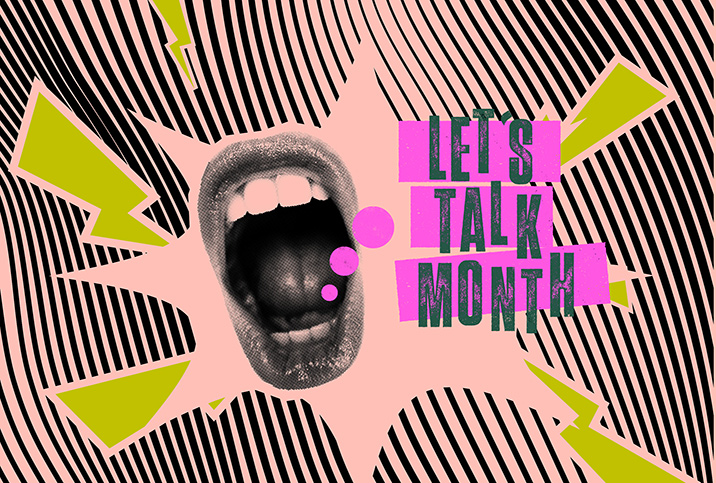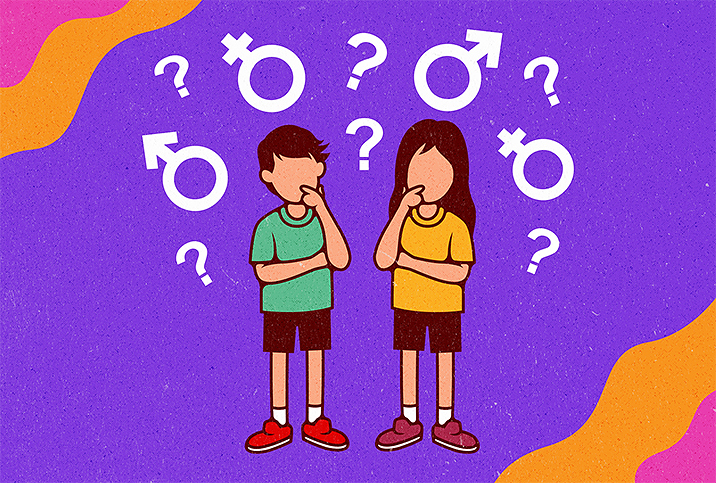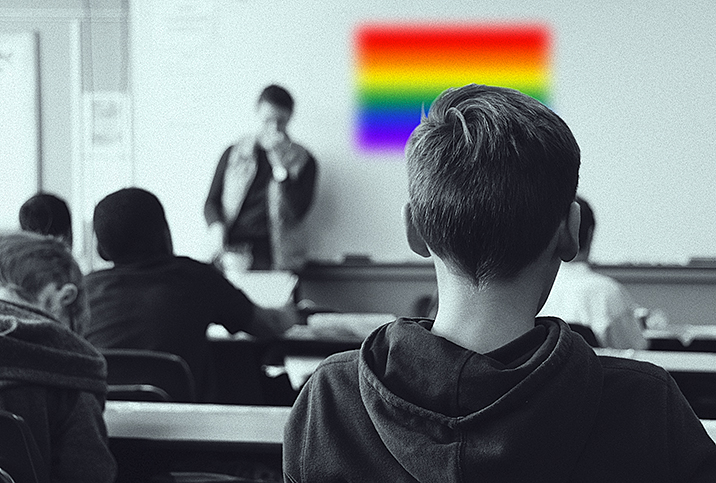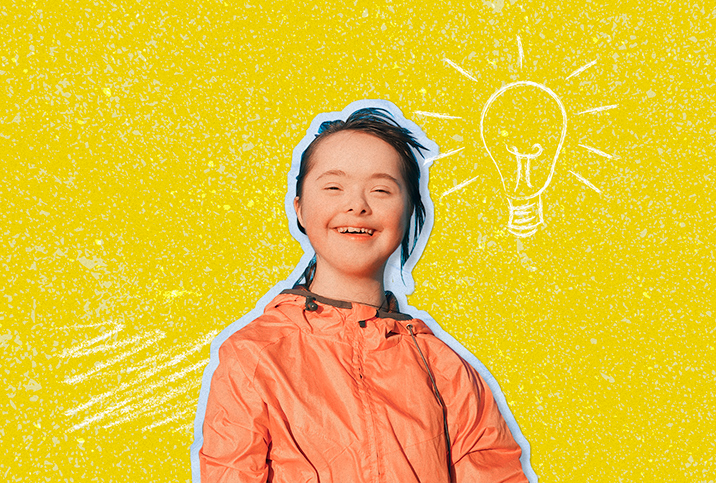Let's Talk Month Gets Parents Involved With Sex Ed

For the month of October, Planned Parenthood is observing the Let's Talk Month initiative, which represents a push for sexual health awareness in the form of adults opening a dialogue with the young people in their lives.
To understand more about this program, Giddy spoke with Sara C. Flowers, DrPH, vice president of education and training for Planned Parenthood Federation of America. Flowers discussed parents' role in sex education, why an inclusive kindergarten through 12th-grade curriculum is vital and why just having "the talk" isn't enough.
According to the Planned Parenthood website, "young people and parents are encouraged to communicate with one another about sexuality—including relationships, bodies and body image, reproduction, gender and sexual orientation, sexual behavior, and preventing pregnancy and STDs."
In the United States, sex education guidelines vary greatly from state to state, with some exclusively promoting abstinence-only curricula. In fact, only 29 states and the District of Columbia require sex ed as part of an educational agenda, and 13 states don't require sex education to be medically accurate or culturally responsive.
This shortcoming can lead to a lack of knowledge on important points such as identity, consent, sexuality and more.
Editor's note: This interview has been edited for length and clarity.
What is the general overview of the Let's Talk Month initiative?
Flowers: Let's Talk Month is a monthlong observation, which was started by Advocates for Youth, a partner to Planned Parenthood and a leading sexual education group. It began with the notion that there's an important opportunity to highlight, lift up and focus on the value of open communication between young people and the adults in their lives.
What are things about sex education that have changed, and what are things that have changed in our society that relate to how this education should be delivered?
Sex education centers our humanity. When we think about sexuality and identity, these are elements present in each of us. They may be different in each of us and show up differently, but it's a piece of each of us and it's inextricable for every human on the planet.
The way we talk about things changes, and sex education today is inclusive and cognizant of systems of oppression and how different people access healthcare. Many of the systems in this country are whitewashed. When I was young, sex education wasn't broadly addressing the dynamics of race, identity and sexuality, and how those were affected by oppression.
At Planned Parenthood, we're actively trying to understand the historical impact of our country and in having the skills to bring [sex education] into the future so we're not accidentally or purposefully perpetuating the problems of the past.
It's not only about race, either. Sex education and all education should be broadly inclusive for all learners. What we mean by "broad sex education" is that our education should tell a plethora of stories; it's not all white and cisgender, but instead includes a plethora of identities and sexualities.
All young people who experience inclusive sex education face a decrease in bullying and negative outcomes, especially people who identify as LGBTQIA+. We don't need to qualify sex education. In fact, I'm telling you for awareness that the term sex education should inherently be open, inclusive and all-encompassing on its face.
What are some misconceptions, particularly in America, that people still have about sex education?
Yeah, what I want to assert is [that] there are a number of small groups, a small and vocal group, who really are broadly attacking—kind of like an anti-truth campaign—what you're allowed and not allowed to say. The people who use anti-LGBTQIA+ rhetoric, want anti-trans legislation and are against critical race theory, this is often one loud group of people who are perpetrating that they care [about sex education].
I think what's important for parents and caring adults is that broadly we know voters across the country, whether they identify as Democrat or Republican, want sex education. They want their children to have the skills to engage in fulfilling, healthy relationships with themselves and others, and they want them to know how the body works.
If we compare sex education to math, we know that with math we start with the basics. The same thing needs to happen with sex education. We want young people to understand the needs of their body parts, and then we go from there, to hormones and how that impacts them and then interpersonal relationships and what they're comfortable with, with regard to their body autonomy. For consent, it's about building boundaries and people understanding boundaries and knowing that saying no and accepting no is OK.
The idea we are trying to convey about sex education is that it should be included all the way from kindergarten through 12th grade, and cadenced and sequenced in an intentional way. Each class would build on the other.
There are national sex education standards [established by The Future of Sex Education] and that's a learning framework which goes from kindergarten through 12th grade, and it was established by a group of organizations who have sought to help parents understand what this looks like.
How should parents begin this dialogue with young people?
At different ages and stages, our kids come in contact with a number of adults. Most parents are not sex educators because it's a profession and it's a skill with regards to delivering accurate information about bodies, health, and our social and emotional selves. It's all about integrating that skill set, and all of that is a part of being a sex educator.
Parents don't need to be that, but parents have an opportunity to learn on their own. We have a ton of research and resources for parents and caring adults that they can begin with. But they can also demonstrate conversations and open dialogues about consent and bodily autonomy.
When speaking, use the correct body parts, honor relationships and listen to your child. Ask about their friendship dynamics. For parents, there's an opportunity to learn and engage, and then they can get involved with what is being offered at their schools.
For example, parents who want sex education for their kids should realize it's generally a school and school board-level decision. Parents should find out who makes these decisions and get involved; there's an opportunity at the local level for them to get involved and find out what their kids are learning. Plus, Planned Parenthood affiliates are providing sex education across the nation, and other places have resources and training, too.
What are some major gaps in sex education that parents and educators need to address?
I think the opportunity that this observance presents is highlighting the unique position and value that parents have around being in conversation with the young people in their lives. I wouldn't say it's necessarily a gap, but parenting, from my own experience, is a journey. It's a marathon, not a sprint. Let's Talk Month is in place so parents can understand that even though they don't have all the answers, we know young people want to hear about these topics from adults in their lives.
Starting these conversations is a way to help and build that dialogue. What happens to bodies is a whole experience; everyone who's an adult made it through puberty. It's a journey and it happens to everyone. So what are the ways that parents are acknowledging how puberty can be weird and challenging? For instance, you might say, "I'm here and if I don't know the answers, we'll look it up together." Parents can be a resource. It's up to us, as caring adults, to get these conversations started, model an open dialogue and model vulnerability.
One aspect of the messaging for this month I find most interesting is the idea that parents and adults are already informing their children and young people about sex and relationships with the examples they set. What are some common actions adults should be mindful of?
Apologies are ones to think about because we are human and apologies are complicated. I remember when my kid was 3 and a kid would do something to hurt another kid's feelings, and I'd hear adults saying to the offender, "You have to say you're sorry." Well, at 3, they're probably not actually sorry. Understanding others' feelings is a developmental stage that comes later.
[But] if I snap at my partner, whatever the reason, do I also apologize in front of my kid? How are we demonstrating that we are going to make mistakes but that we are also going to come full circle? It's OK to make mistakes, but you need to own them and learn from them to be a good model.
The term "sex" alarms adults because it goes to an adult place. But really what we're talking about is building a foundational skill set in how we understand ourselves and others, and we use those throughout our lives. If they stumble, how do we help them recover and learn from their mistakes? It carries us in our interpersonal relationships.
For anyone who's a learner around sex education, being able to understand and identify your own feelings, and then understand how you take action from those feelings, is a skill that's important and helps set you up for success throughout life. That's something we can learn, think about and practice in sex education.
Another aspect I enjoyed reading was the myth-busting of "the talk" as this absolute, all-encompassing moment. Why does a sense of intimidation persist around "the talk?"
It's so funny, I think the answer to this question is about how society is evolving. So this country was rooted in puritanical, colonial values. When you think about the dynamics around sex and sexuality in the history of this country, it's really important to consider that history. In the '60s and '70s, when having "the talk" was innovative, that was parents being on the cutting edge.
Today, we understand we can do more and do better. Humanity is not just something where we can have one conversation; it's something where we continue to evolve. We are all still learning, and it needs to be more responsive to the reality of the way human beings think and learn and evolve.
For more information about Let's Talk Month, and for sex education resources that could help you open a dialogue with your loved ones, visit the Planned Parenthood website.


















